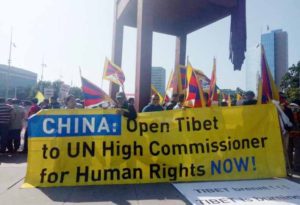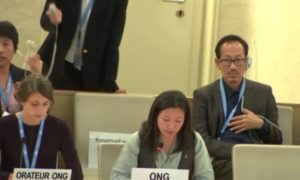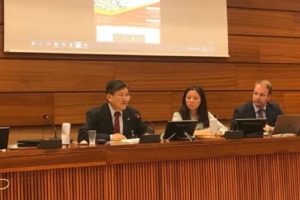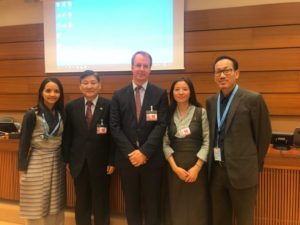The issue of Tibet and the human rights abuses suffered by people living there was brought to the attention of the United Nations Human Rights Council at the 42nd regular UN Council session in Geneva on September 11.
Council members were called upon to properly assess Chinese development projects in Tibet, including the eviction and demolition of Tibetan Buddhist centres, mining and the non-sustainable damming of Tibet’s rivers, all of which threaten and violate the basic social, economic and cultural rights of Tibetans.
Ms Dukthen Kyi from the United Nations (UN), European Union and Human Rights Desk of the Central Tibetan Administration (CTA) delivered a statement highlighting the failure of the to include active participation of Tibetans in their development projects. She also drew attention to the more than two million Tibetan nomads who have been relocated to make way for the damming and mining. “We also urge the Council members to assess the demolitions of Tibetan Buddhist Centres and development activities in Tibetan areas, that are causing more harm than benefit for the Tibetans in Tibet,” she added.
Ms Kalden Tsomo, UN Advocacy Officer at the Tibet Bureau in Geneva has raised the issue of China’s policy to crack down on Tibetan Buddhism, and China’s stated intention to interfere in the process of reincarnation for His Holiness the Dalai Lama. She raised concern over China’s ban on retired Tibetan retirees from doing Kora, a Tibetan spiritual practice of circumambulation of holy sites, and prohibiting Tibetan students from various middle schools from participating in religious festivals and ceremonies. She said China’s control over the practice of Tibetan Buddhism to achieve political objectives is a grave concern urged Council members to encourage the People’s Republic of China to have a meaningful dialogue with representatives of His Holiness the Dalai Lama.
A side event, Development or Destruction? The State of Socio-economic and Cultural Rights of Tibetans, took place on September 12, organised the Society for Threatened Peoples, an international human rights non-government organisation.
Mr Sonam Norbu Dagpo, Secretary of the Department of Information and International Relations,spoke of issues related to Chinese development projects in Tibet which cause irreversible environmental damage, and rob local Tibetans of any benefits from these projects. He said that Tibetans are not against development in Tibet in principal but these projects should be culturally acceptable, environmentally sustainable, economically beneficial and socially inclusive of the local Tibetans.

Tibetan communities in Switzerland and Liechtenstein, Belgium and France demonstrating in front of the UN office
Photo: tibet.net
On September 20, to coincide with the ongoing UN session, the Tibetan communities in Switzerland and Liechtenstein, Belgium and France held a public demonstration in front of the UN office voicing their protest at China’s continuous human rights violations in Tibet. They were joined by members of the Uyghur community living in Switzerland and Germany. Uyghurs are a Muslim minority community living in East Turkestan in north western China and are subjected to human rights violations similar to those endured by Tibetans in Tibet.







 Print
Print Email
Email